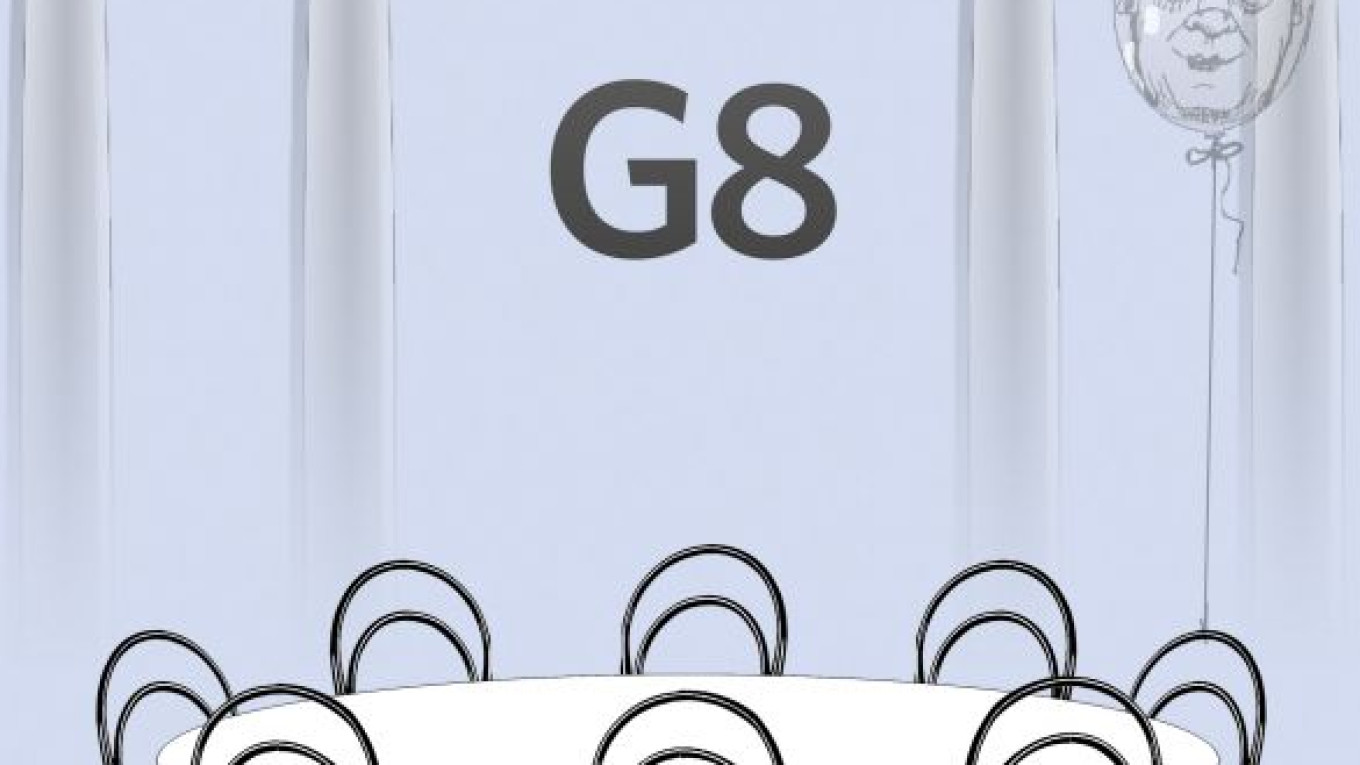In the mid-1990s, former President Boris Yeltsin fought hard for the right to sit as equal at the same table with the leaders of the world's seven leading democracies. Using a lot of political wrangling, Moscow finally secured permanent membership in this elite club where the real heavyweights are supposed to solve the world's most pressing problems. In practice, though, during Group of Eight summits, few problems are actually solved, while participants spend more time haggling over every word in the final communique, ending up with a document lacking any hard guarantees or commitments.
If Putin cannot find a way to influence Western leaders in the G8, perhaps his best option is to try to belittle them. Thus, Putin came up with a ridiculous excuse for his inability to attend the G8 summit at Camp David and sent Prime Minister Dmitry Medvedev in his place. As a result, the leaders of the G7 were forced to sit alongside a powerless stand-in, who seemed to play this role with masochistic pleasure. For example, Medvedev cheerfully posed for photographs with world leaders and posted them on the Internet as if he was sending friends pictures from his vacation, not a global summit.
Like a passenger on the Titanic who smiles naively for the camera as the fatal iceberg looms in the background, Medvedev blithely reported, "This was perhaps the most problem-free summit yet, judging by the few disagreements among the various national delegations and individual leaders." I suspect that he came away with such a rosy impression for the simple reason that he was excluded from the more serious and difficult consultations among Western leaders.
But in reality, the G8 members split into two opposing camps over how to solve the economic crisis. U.S. President Barack Obama and a host of European leaders contended that increased investment in the economy is necessary to expand production and create more jobs. Meanwhile, German Chancellor Angela Merkel said the solution lies with strict controls over spending and the money supply to limit inflation. The final communique issued by the summit reflected the delicate balancing act between those two approaches.
At the same time, Medvedev seemed to be in a state of euphoria, claiming that the global economic slowdown has had no bearing on Russia. "For now, the overall situation with our economy is fine because we had a budget surplus last year," Medvedev said. "Naturally, this year will be more difficult, but we'll manage just the same."
Although Medvedev had nothing to offer his Western colleagues, his time there was not entirely wasted. He did play the role of postman quite well, delivering a letter from Putin to Obama. Putin objected to traveling to Camp David not only because he didn't want to subject himself to a mild dressing down from his Western colleagues over the use of force against demonstrators and other human rights violations. The simple fact is that, without a single constructive idea to his name, Putin had nothing substantial to say on any subject on the summit's official agenda.
The G8 summit did touch on security issues — where Moscow considers itself a major player — but only in passing. Instead, those issues were central to the NATO summit that began in Chicago on Sunday. Russia did not send any top government official to the summit, which is apparently how the Kremlin tried to show its dissatisfaction over the U.S. plan to deploy missile defense installations in Europe.
But Afghanistan was a much more important issue at the NATO summit. NATO member countries are mainly focused on how to withdraw their troops, and that means the Russian leadership should be concerned about what will happen after NATO troops are gone. Few believe that there will be any kind of peace in Afghanistan after NATO forces leave. Civil war and unrest could easily spread to the Central Asian republics, and that means a wave of refugees, as well as Islamic radicals, could soon spill into Russia.
If Moscow needs a pretext to criticize the West, it should focus on Afghanistan, not missile defense. In place of pointless bickering over what the U.S. missile defense system might be able to accomplish in 20 or 30 years, Moscow should raise the issue of the U.S. and NATO responsibility for security in the region — an issue that will have a direct impact on Russia in less than two years.
Security in Afghanistan is exactly what senior Russian officials should be discussing with their partners in the G8 and NATO. But then Moscow would have had to actually appear at these summits with constructive ideas. It is thus not surprising that Putin was a no-show.
Alexander Golts is deputy editor of the online newspaper Yezhednevny Zhurnal.
A Message from The Moscow Times:
Dear readers,
We are facing unprecedented challenges. Russia's Prosecutor General's Office has designated The Moscow Times as an "undesirable" organization, criminalizing our work and putting our staff at risk of prosecution. This follows our earlier unjust labeling as a "foreign agent."
These actions are direct attempts to silence independent journalism in Russia. The authorities claim our work "discredits the decisions of the Russian leadership." We see things differently: we strive to provide accurate, unbiased reporting on Russia.
We, the journalists of The Moscow Times, refuse to be silenced. But to continue our work, we need your help.
Your support, no matter how small, makes a world of difference. If you can, please support us monthly starting from just $2. It's quick to set up, and every contribution makes a significant impact.
By supporting The Moscow Times, you're defending open, independent journalism in the face of repression. Thank you for standing with us.
Remind me later.


